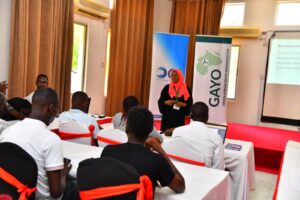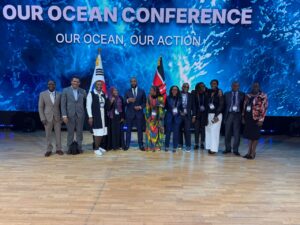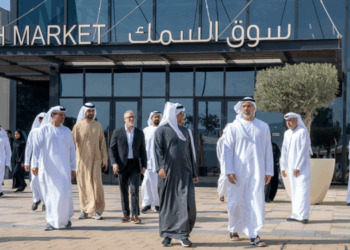STEM from the Shoreline: Dr. Mariam Swaleh’s Blueprint for Empowering Coastal Women and Youth – Dr. Mariam Swaleh wears many hats: she is a chemist, marine scientist, Assistant Registrar for Research and Grants at the Technical University of Mombasa, and the Head of the Ocean Innovation Hub, Kenya. Her journey into ocean science is as powerful as the work she leads today, grounded in experience, driven by purpose, and anchored in a deep commitment to equity and innovation.

From the Shores of Mombasa to the Frontlines of Ocean Science
Dr. Swaleh’s entry into marine science in Kenya was far from conventional. Raised in Mombasa and crossing the Likoni Ferry daily on her way to school, she was constantly surrounded by the ocean, yet never taught to look at it through a scientific lens.
“Despite being by the sea every day, marine science was never part of our education or household conversations,” she recalls. “It was during my undergraduate research at the Kenya Marine and Fisheries Research Institute (KMFRI) that everything changed. I was studying solid waste dumping nearshore at Kibarani and witnessed firsthand the heartbreaking environmental degradation. That moment made it impossible for me to walk away. I knew I had to be part of the solution.”
This revelation marked the beginning of a transformative journey, one that would not only take her deep into marine research but would also fuel her passion for driving locally rooted innovations that serve coastal communities.
The Power of Encouragement and Representation in STEM
Growing up on Kenya’s coast laid the foundation for Dr. Swaleh’s connection to the ocean, but it was her father’s unwavering support that truly propelled her forward in a male-dominated STEM field.
“He believed in my potential and pushed me to pursue science when very few girls around me were doing so,” she says. “That early encouragement shaped my confidence and career path.”
As she advanced in academia and earned her PhD in chemistry, she began to notice the glaring underrepresentation of coastal women in marine science. This realization now drives her advocacy work.
“Representation matters. So many gifted girls just need someone to tell them it’s possible. I’ve made it my mission to share opportunities and openly talk about my journey to help light that spark in others.”
Ocean Innovation Hub: Bridging Gaps, Building Futures
At the heart of Dr. Swaleh’s current work lies the Ocean Innovation Hub Kenya, a transformative initiative endorsed by the UN Ocean Decade through the Global Ecosystem of Ocean Solutions. Its mission is bold yet simple: to break down silos and make ocean-climate innovation accessible, inclusive, and community-led.
“Coastal communities are facing a convergence of threats—climate change, overfishing, pollution, and economic marginalization,” she explains. “And yet, the solutions often remain disconnected from these communities. That’s the gap we are addressing.”
Through the Ufukwe Marine Centre, the Hub focuses on turning scientific knowledge into practical, locally owned action. They champion ocean-based climate solutions that center the voices of women, youth, and coastal innovators.
“We believe knowledge is power. Whether it’s highlighting community-led success stories or introducing emerging technologies like marine carbon dioxide removal (mCDR), we ensure communities are not just participants, but leaders in shaping their ocean future.”
Youth innovation is a central pillar of the Hub’s approach. Platforms are being created for young minds to explore cutting-edge ocean solutions, participate in marine research, and shape the narratives of blue economy development in Kenya and beyond.
Marine Carbon Dioxide Removal: Africa’s Next Frontier
One of the emerging areas Dr. Swaleh is deeply passionate about is marine carbon dioxide removal (mCDR)—a crucial frontier in climate action.
“Africa has shown great leadership in nature-based solutions like mangrove restoration. But when it comes to technological mCDR methods, like ocean alkalinity enhancement or direct ocean carbon capture, we’re still at the starting line,” she says.
To change this, the Ocean Innovation Hub is helping to develop an African mCDR Roadmap, a regional strategy aimed at advancing:
- Scientific understanding
- Policy development
- Community engagement
“We can’t afford to be left behind. This roadmap is about ensuring Africa contributes to, and leads in, shaping ocean-climate solutions that work within our unique contexts.”

Africa’s Voice at the Global Table: Lessons from South Korea
Dr. Swaleh was among the African leaders who played a pivotal role at the Our Ocean Conference in South Korea, where a groundbreaking Africa-led side event spotlighted the continent’s climate-positive blue economy vision.
“It was a defining moment,” she reflects. “We co-hosted the only African-led side event, and the turnout and participation were incredible.”
Distinguished leaders such as Cabinet Secretary Ali Hassan Joho (Kenya), H.E. Princess Dugba (Sierra Leone), Ambassador Togolani Edriss Mavura (Tanzania), Mr. Kofi Agbogah (Ghana), and Dr. Francesca Santoro (UNESCO-IOC) graced the event, sending a powerful message of unity and ambition.
“Global engagement is vital. Kenyan researchers must be part of international dialogues, not only to learn, but to influence and inspire. We have homegrown solutions and unique experiences to offer the world.”
Dr. Mariam Swaleh’s story is not just one of academic excellence; it is one of relentless purpose, community devotion, and a vision for a more inclusive and innovative ocean science landscape in Africa.
From the ferry crossings of Likoni to leading global conversations on marine carbon capture, she embodies what it means to transform personal passion into societal impact.
As she puts it: “Sometimes, all someone needs is to hear that it’s possible. That’s how you start a ripple. That’s how you create waves.”
STEM from the Shoreline: Dr. Mariam Swaleh’s Blueprint for Empowering Coastal Women and Youth







